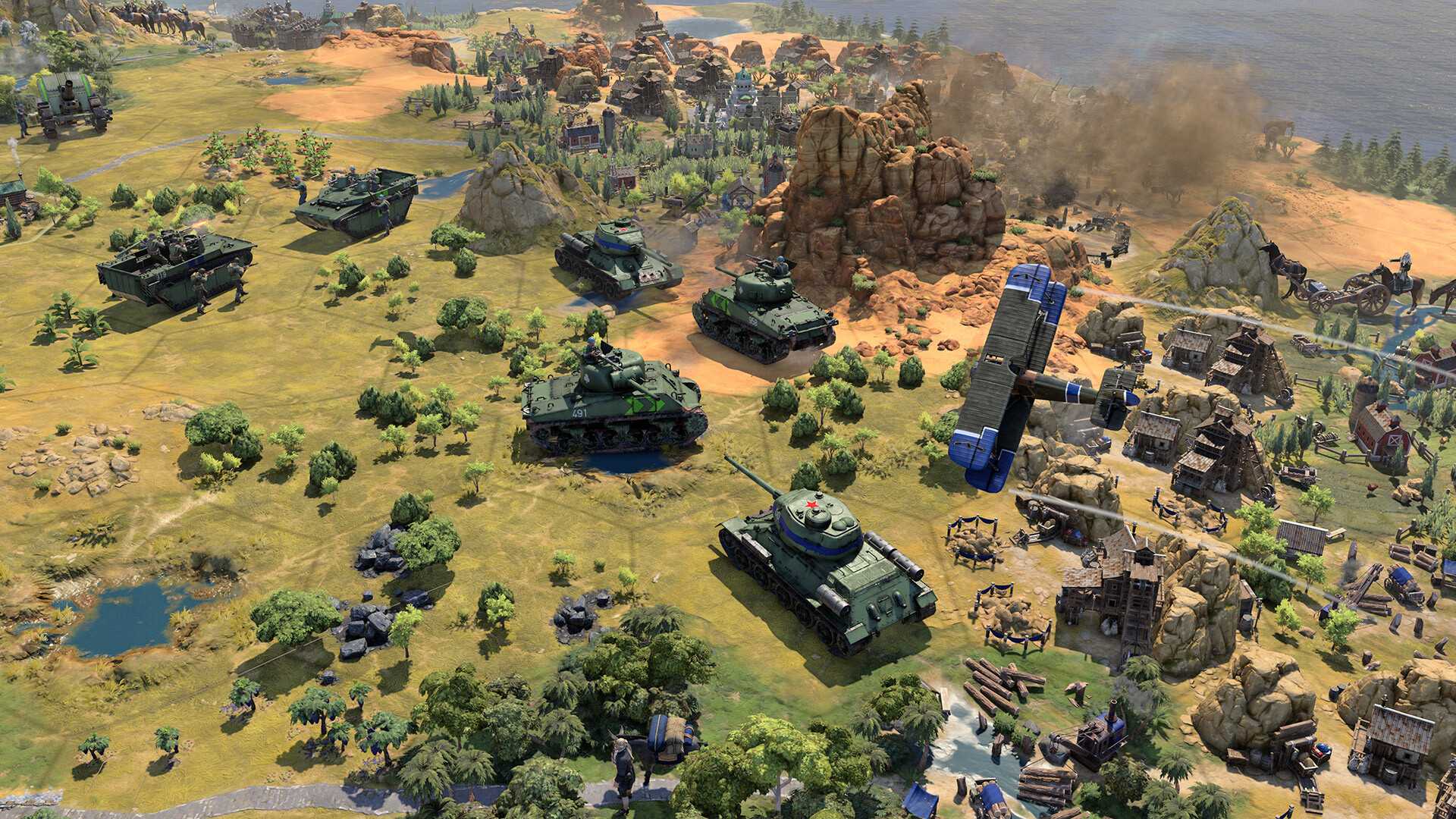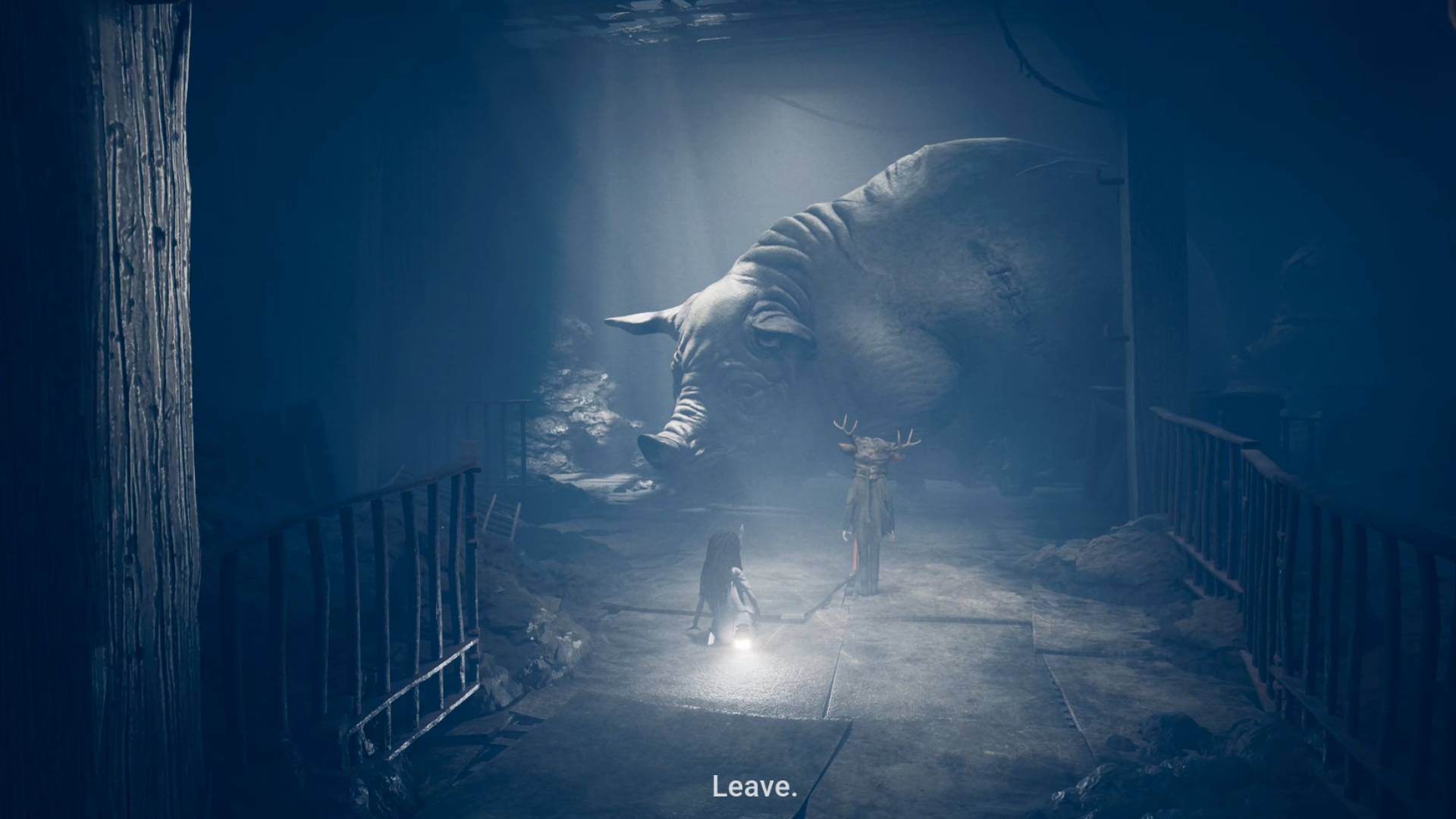GamesRadar+ Verdict
Civilization 7 is a revolutionary strategy game for newcomers and long-time fans alike. Though some tweaks around diplomacy and Ages fall short, a host of small reinventions – along with Firaxis' biggest gamble in tackling the tedium of long-running campaigns – pays off superbly.
Pros
- +
Ages make late-stage campaigns less of a chore
- +
Separating leaders and civilizations makes every faction more consistently meaningful
- +
This is the best Civ has ever looked
Cons
- -
Transitioning between ages feels heavy-handed
- -
Diplomacy is missing some key features
- -
Legacy Paths can be one-dimensional
Why you can trust GamesRadar+
War. Colonization. Atomic bombs. I know these things are bad. But if there's one thing I hate more than nuclear hellfire, it's losing in games – so when Firaxis' latest turn-based strategy Civilization 7 dangles these options in front of me as a means of beating slimy Ben Franklin and his diplomacy-loving ways, I gobble up its sinful platter like the greedy little war criminal I am.
Civilization 7 brings a lot to the table, and not all of it requires abandoning your morality to play with. Fans of the series will find a map that's livelier than ever, city management that won't overload your brain, and one of the most engaging endgames ever devised. While predecessor Civilization 6 crammed in similar depth without quite managing to convey all of it clearly, Civilization 7 feels like a cohesive next step for the franchise – and when a few quirks are ironed out, this will be the series' best modern iteration to date.
Next turn
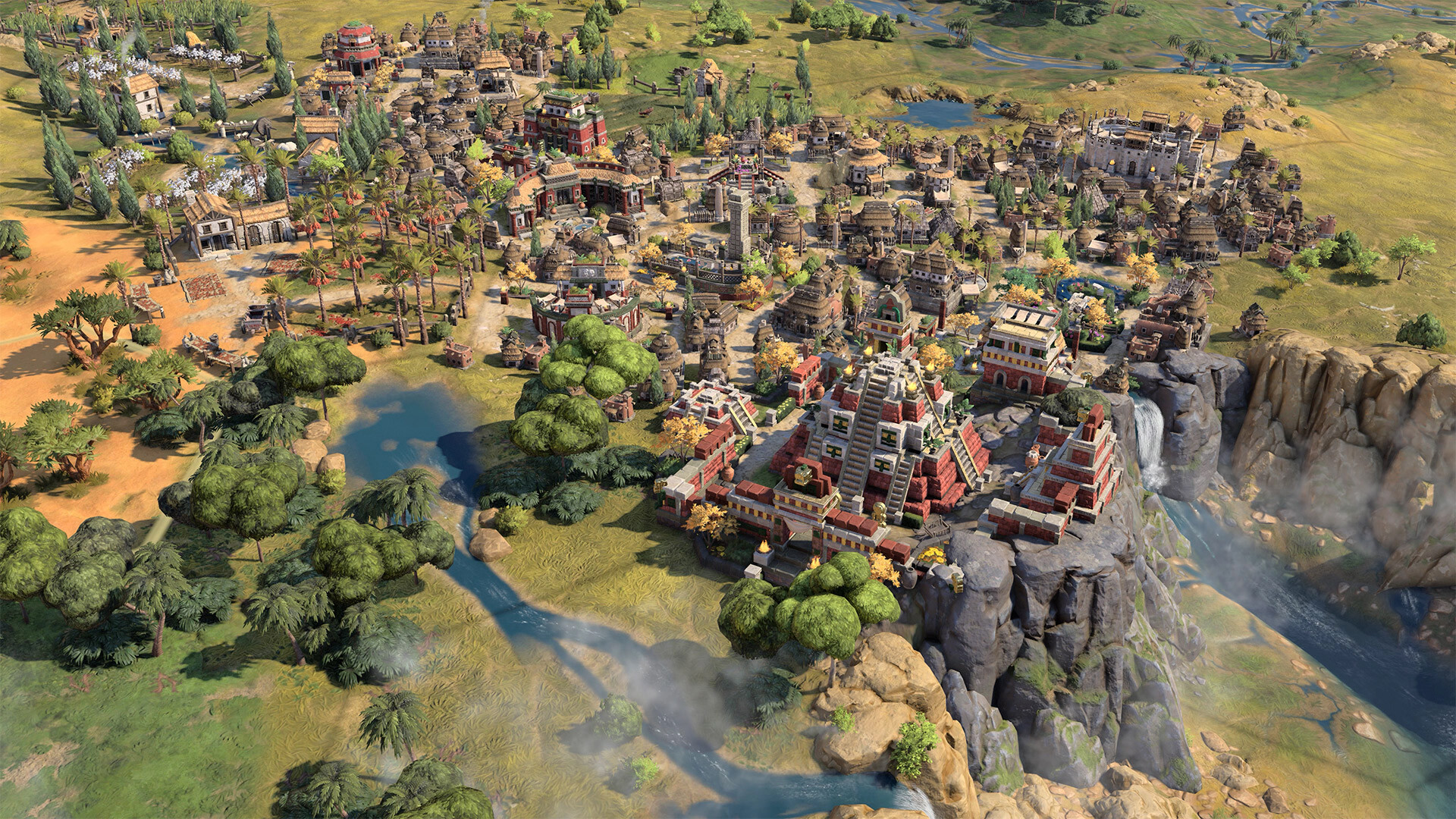
Release date: February 11, 2025
Platform(s): PC, PS5, PS4, Xbox Series X|S, Xbox One, Nintendo Switch
Developer: Firaxis
Publisher: 2K
Whether you're a returning fan or stepping into Firaxis' iconic 4X (exploration, expansion, exploitation, and extermination) strategy series for the first time, Civilization's core premise remains largely the same. Starting with one settlement, you'll grow your empire across a randomly-generated world with the goal of seizing victory through scientific, cultural, militaristic, or economic means. It's a tried-and-true formula, but Civilization 7 takes a couple of big risks that shake it up creatively.
The first thing you'll notice is that you no longer pick a Civilization and get to work. Instead you choose a leader – who remains with you through an entire campaign – while your Civilization choice changes at several points based on your playstyle and leader's historical background. Rolling with Confucius, for example, opens up Ming China as an option, due to his real-world background, but with multiple iron mines in the bag, I could also go Norman.
I was worried this feature would dilute the identity of factions, but that's not the case. Rather than picking a civilization with a unique unit that's obsolete 50 turns in (or one that doesn't turn up for another 200) you now get to pick a total of three civs that are relevant for their entire duration, all with the nifty perks and special units you would expect from past Civ games.
Likewise, I've been dreading how Ages would work since Civilization 7's reveal. Since the '90s, Civilization's whole deal has been unleashing players in a sandbox and letting them do their thing (see: war crimes) uninterrupted. Now, each match is divided into three segments – the opening Antiquity Age, followed by Exploration, and finally Modern.
It's not always a smooth transition, as each Age has a hard stop that resets the board a little. This is particularly frustrating if you're in the middle of something important. In one match, I was closing in on the end of a particularly bloody war and within reach of my mortal enemy Amina's capital when the Age shifted from Exploration to Modern, ending our war and warping my soldiers back to my own distant territories. The rancid cherry on top? Some of the no-name civs who were trailing on the leaderboard got a major science boost through the interim, meaning my empire was promptly invaded by landships while its citizens were still marveling at the wonders of the wooden wheel.
Weekly digests, tales from the communities you love, and more
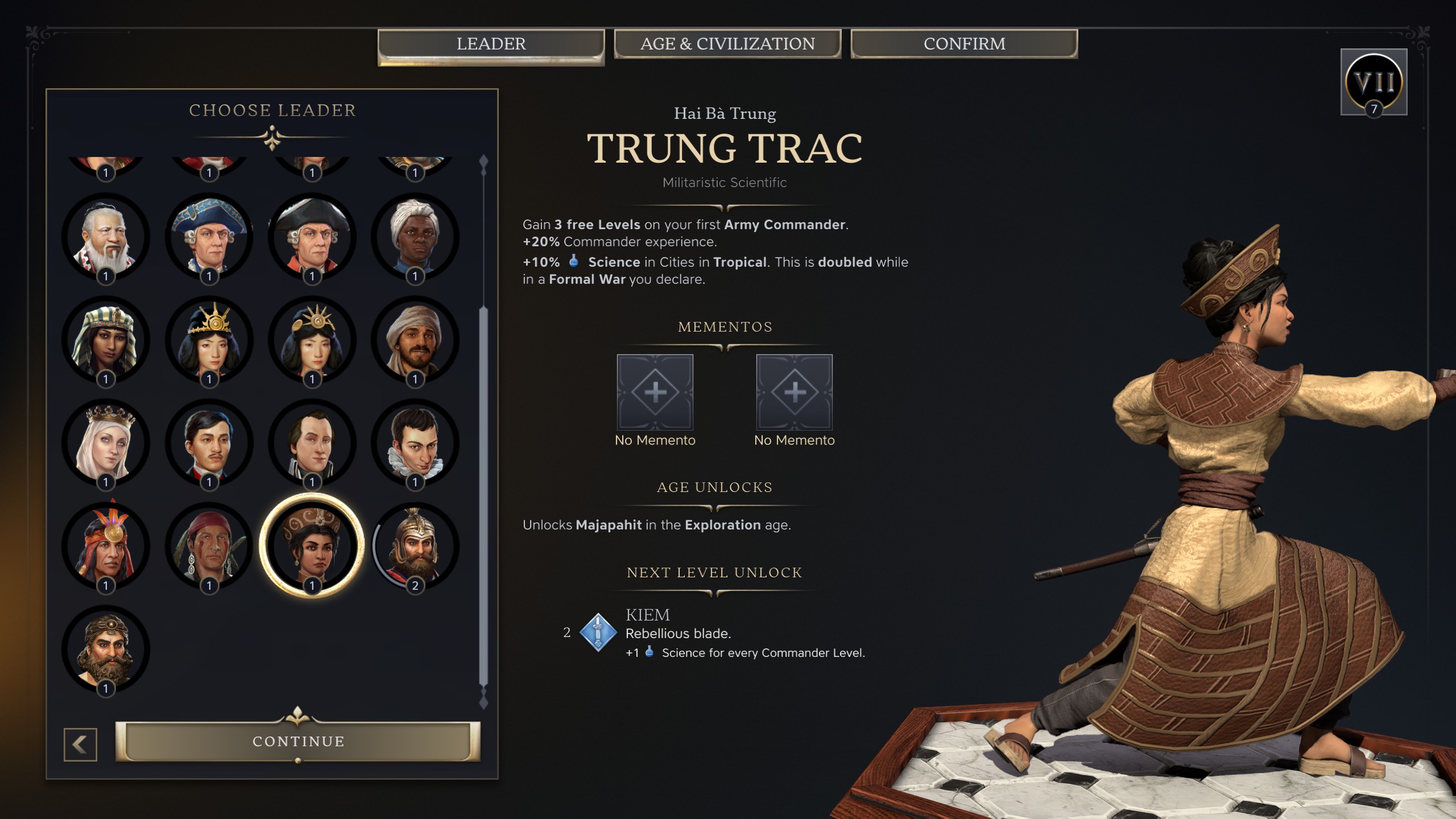
That's not an indictment, though. Since then, I've realized that it takes time to learn how Ages work. In previous entries you'd slowly build strength through the course of each game – conquering capital cities, hurtling towards space flight, or hoarding cultural wonders like a well-read toddler – until it all came to a head. In Civilization 7 victory is more measured, and to carry your momentum through to the next Age you need to complete Legacy Paths: a series of win conditions for each individual age, rewarding permanent bonuses. If you want to win through science, for instance, you'll start by rushing to build libraries and academies in Antiquity, prioritize housing specialists in your cities through Exploration, and finally try to be the first civ in space during Modern. Doing so lets you carry powerful perks across Ages, whilst neglecting them is a surefire way to fall behind.
I've got mixed feelings. Legacy Paths and Ages make the early and mid-game feel a lot more dynamic, and freshen up a campaign's later stages. But at times it feels like you're being railroaded into one path – a little jarring, given the freedom of Civ's sandbox approach up to this point. Although I'd like to see more objective varieties or pathways through these Legacy Paths, I do think that Ages (even if they're a little heavy-handed) are an improvement to the formula, if only because the endgame is no longer ticking boxes until you reach a surefire win.
I'll stay right here
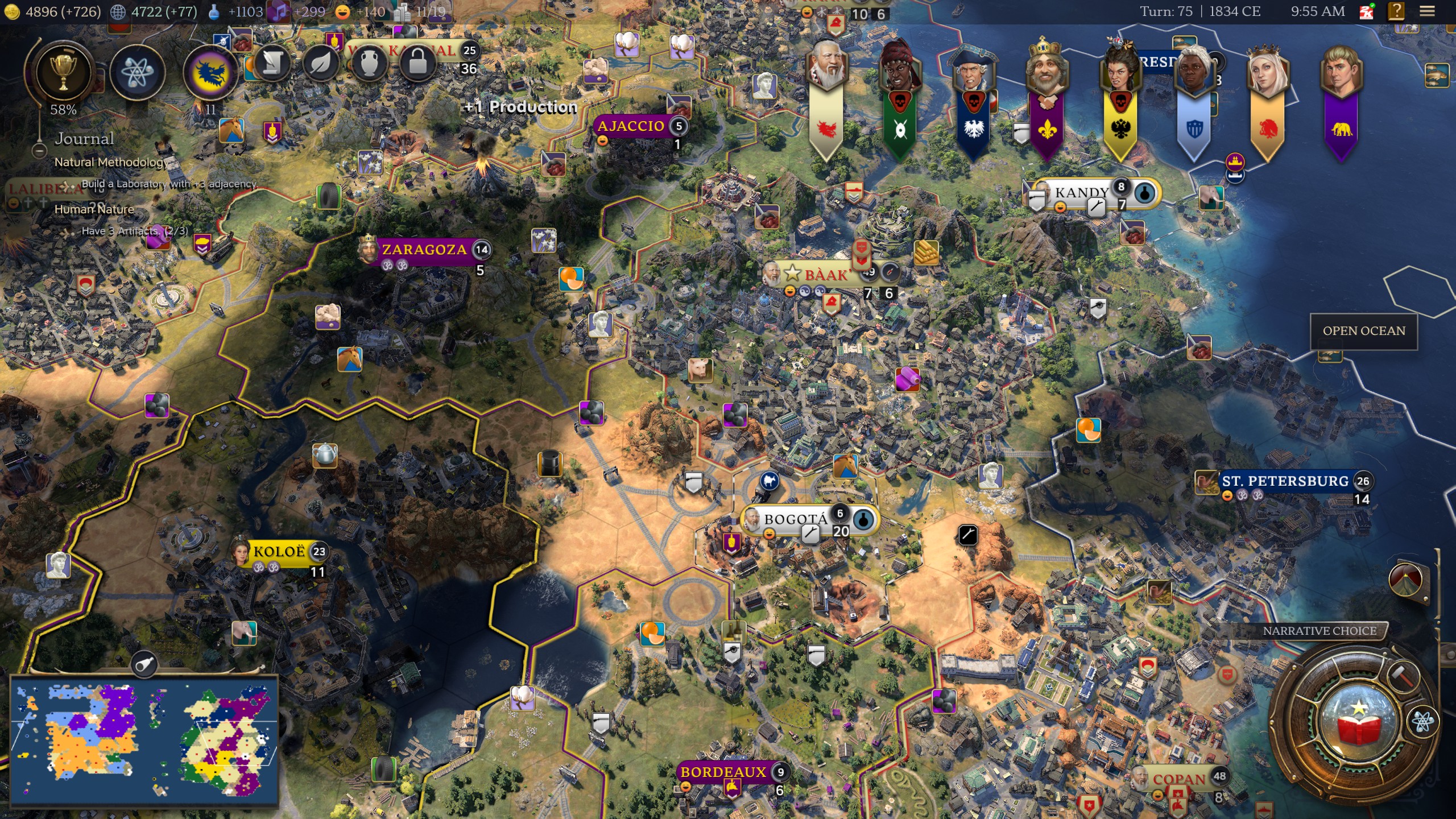
When all of that clicks, Civilization 7 is a thrill. Outside of the big gambles, the core Civilization experience is lightyears ahead of anything we've seen from the series before. Moving from one turn to the next is near-instantaneous, and besides the world looking sublime with its visual glow-up and warmer palette, it feels livelier than ever. Volcanic eruptions change surrounding tiles, rivers flood, and powerful storms can wreak havoc. I nearly missed out on colonizing a new continent (boo-hoo, I know) because a huge hurricane kicked up as my army was crossing the ocean, gaining on their ships as I furiously fear-hammered movement commands to reach the coast.
That liveliness extends to combat's impressive fluidity. Army commanders allow you to stack units and transport them around in-sync, and can order simultaneous attacks that are worth utilizing – having every archer in range fire at once gives each unit involved more combat strength, for example, but you can also command mass pillaging or have everyone construct makeshift fortifications on their tiles.
During my first campaign as Xerxes, a three-way war with my continental neighbors Machiavelli and Himiko drew the attention of meddling outsiders Ben Franklin and Ashoka, World Renouncer. The latter two factions had no settlements in the continent, but decided to wade in anyway, landing masses of tanks and gun-toting infantry on our shores and transforming the countryside into a fiery wreck until I turned the sea into a killing field of my own with a blockade of battleships. I've sunk hundreds of hours into Civilization, but that single conflict is the most fun I've ever had with combat.
All's fair
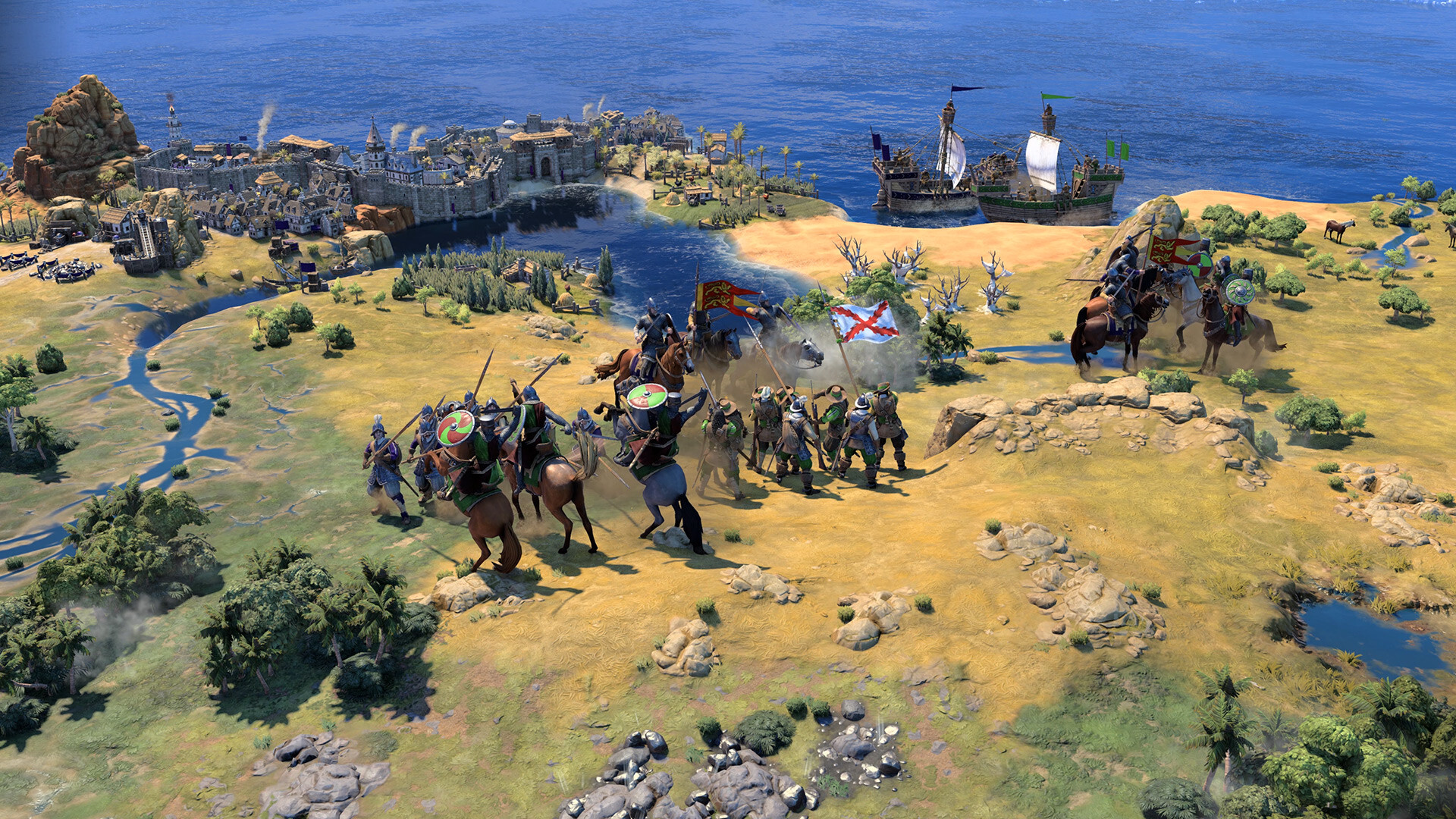
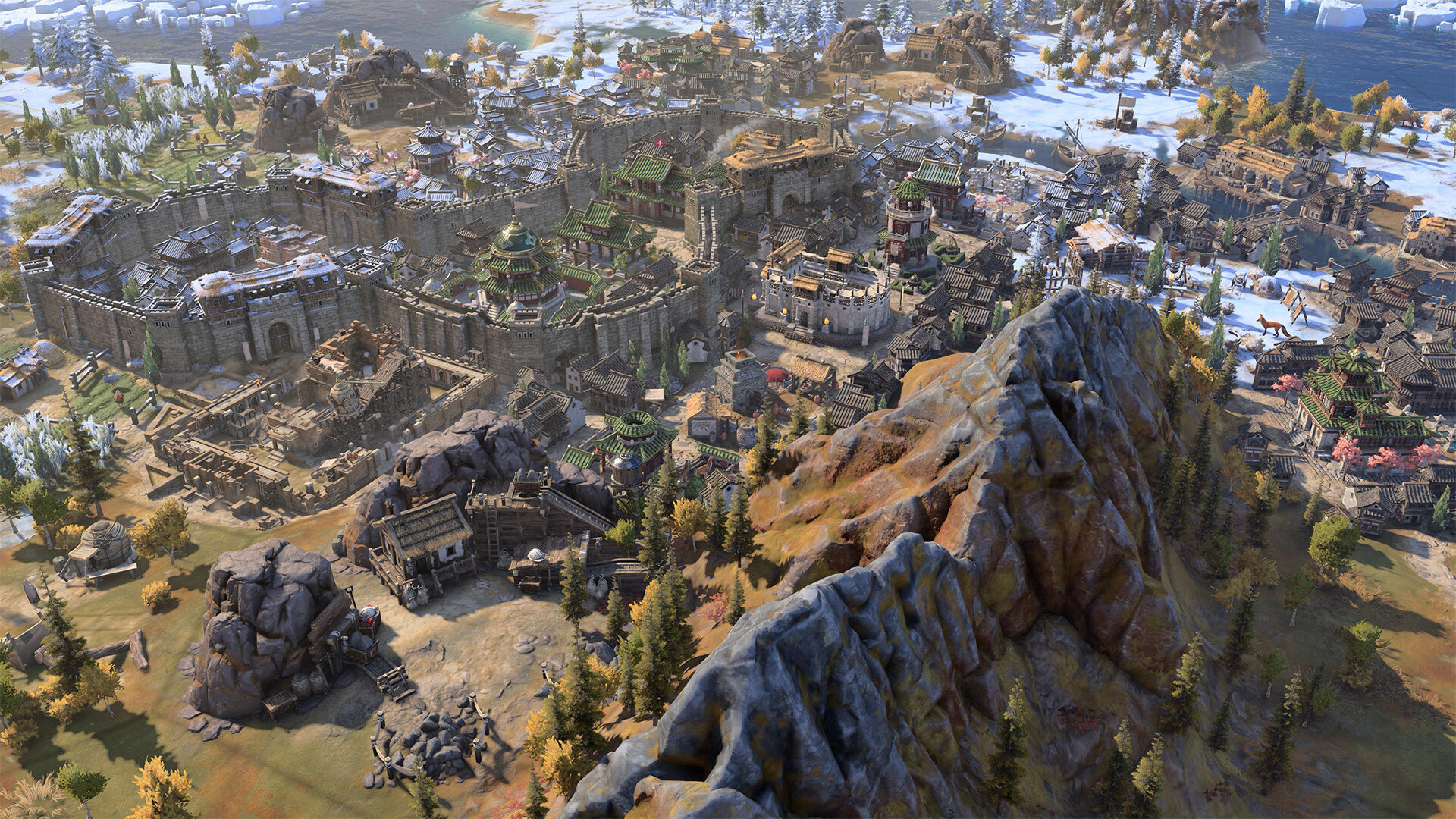
Independent powers – a new cross of barbarians and city states – can churn out hostile soldiers early on. You'll have to stock up troops of your own, or burn through Influence (Civ 7's new take on diplomacy) to deal with them.
Commodifying diplomacy is an interesting choice (see Strong Influence). Firaxis has long tried to play around the fact that AI motivations can be inscrutable, and reducing it to a resource is an inelegant but mostly effective solution. Besides using it to push trade, scientific, and commercial agreements with other civs, Influence can boost your support for a war back home – whichever side of the battle has lower support takes some pretty harsh penalties in combat, so it's important to keep the troops happy. But it's also a step back in some ways, as gold can no longer be used to tantalize other civs into settling wars, and you can't buy or sell settlements.
This is particularly frustrating because razing settlements in war permanently penalizes your war support for every future conflict, which means that since you also can't milk your rival for gold during peace negotiations, you sometimes have to absorb rubbish settlements rather than burn them to the ground. That in itself is another can of worms, as Civilization 7 goes big on expansion. Settlements are now divided into towns and cities, with the former acting as lower-maintenance support hubs for your cities.
All of that, paired simpler iteration of Civilization 6's district system, means juggling your empire is far less of a headache. Because there are fewer penalties to expanding, you (and AI factions) tend to manage significantly more settlements. Finding unclaimed land is now genuinely scrappy, and racing to plant my flag in undeveloped continents has been the highlight of my time in Civilization 7. I've admittedly found myself engaging with the cultural side of Civ less because of it, though, and AI has an irritating habit of squeezing a town right outside of your established borders.
I had no idea what to expect from Civilization 7. Firaxis has a habit of scaring fans by announcing wild choices (hello, Marvel's Midnight Suns) then pulling them off so slickly you forget there was ever any doubt. Civilization 7 isn't quite so slick – with its heavy-handed Ages diplomacy rework – but it's certainly a huge stride forward for the legendary strategy series, joining the clarity of Civilization 5 with the added depth of Civilization 6.
Ages will be more divisive – I personally think the system does wonders for the usual tedium of late-stage campaigns – while other features, like pairing Leaders with evolving civs, should be a staple going forward. Civilization 7 already feels like the best entry point yet, and with Firaxis' habit of saving the real polish for expansions, I think this is going to become a grand strategy titan. Just keep an eye on that Ben Franklin fella – and don't believe a word he says about any "war crimes".
Civilization 7 was reviewed on PC, with a code provided by the publisher.
Whether you prefer turn-based or real-time map-painters, here are the best strategy games you should check out

Andy Brown is the Features Editor of Gamesradar+, and joined the site in June 2024. Before arriving here, Andy earned a degree in Journalism and wrote about games and music at NME, all while trying (and failing) to hide a crippling obsession with strategy games. When he’s not bossing soldiers around in Total War, Andy can usually be found cleaning up after his chaotic husky Teemo, lost in a massive RPG, or diving into the latest soulslike – and writing about it for your amusement.
